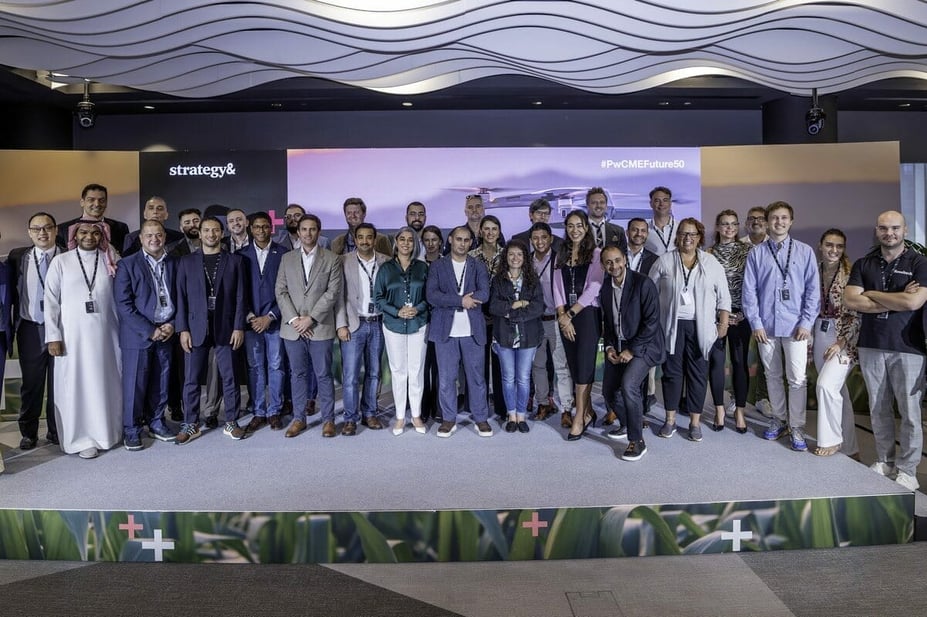PwC Middle East recently published its inaugural Net Zero Future50 report, which showcases 50 pioneering start-ups in the Middle East that are spearheading innovation to combat greenhouse gas emissions and mitigate the effects of global warming across vital economic sectors in the region.
Read more: PwC Middle East identifies top trends driving region’s banking ecosystem
Groundbreaking technologies
The report showcases the groundbreaking technologies and accomplishments of these start-ups in climate management and carbon emissions reporting. It also presents insights into the opportunities and challenges they face as they strive to grow and scale their businesses. Leveraging the extensive PwC network and the expertise of technology partners, we identified 500 start-ups in the climate and sustainability sector operating in the region. Among them, over 200 responded to our public call for nominations at COP27 in Sharm-El-Sheikh, Egypt, last year. Through a meticulous selection process involving detailed interviews and evaluations, the Net Zero Future50 was chosen by a panel of PwC and Strategy& judges who specialize in ESG, digital innovation, and energy transition.
Diverging from global patterns in technology and innovation, more than half of the companies included in the Future50 showcase exhibit female founders or leadership teams that comprise both men and women. An impressive 25 percent of these companies have a female founder, while an additional 32 percent have a diverse team consisting of both female and male founders. This data highlights the remarkable fact that the majority of these startups are led by women.
Furthermore, a significant portion of these founders are young, with almost half of them falling within the age range of 30 to 39. This underscores a fresh perspective and dynamic approach within the sector.
“Our 2023 Middle East Climate Tech report found that despite the region’s commendable increase in investment into global climate tech funding – which nearly tripled to $5 billion in 2023 from $1.8 billion in 2022 – a concerning funding gap persists for local and regional climate tech entrepreneurs. Funding for these entrepreneurs saw a stark decline to $152 million in 2023, down from nearly $1 billion in 2022. Nevertheless, entrepreneurial spirit remains resilient in addressing regional climate issues through innovation,” PwC Middle East said.
Most dynamic entrepreneurs
Dr Yahya Anouti, partner at Strategy& and Sustainability Leader at PwC Middle East, said: “Climate tech innovation in the Middle East is being driven by some of the most dynamic entrepreneurs in our region, championing new technologies to accelerate the path to net zero.”
He added: “While Middle East players are ramping up climate tech spending globally, they can do much more to fund and empower local entrepreneurs, who may represent the ‘missing link’ in their strategy. We call for governments and corporations to play a vital role by establishing specialised funds and off-take agreements, fostering demand and reducing investment risks in the climate tech sector. With COP28 just around the corner, we are delighted to spotlight the contributions of these innovators which are instrumental in driving down emissions and propelling the momentum of decarbonisation in the region”.

Food security
Significantly, the majority of the Future50 innovators are operating within sectors that are responsible for the largest share of greenhouse gas emissions in the region. This indicates that investments are being directed to where they are most needed. Specifically, the Industry, Manufacturing, and Resource Management sectors constitute 22 percent of the overall list, while the Energy sector accounts for 20 percent. When combined, these sectors contribute to 75 percent of the region’s direct and indirect greenhouse gas emissions. Interestingly, the Food, Agriculture, and Land Use (FALU) sector is the third most represented, comprising 18 percent of the list, despite only contributing 2 percent of the region’s GHG emissions. This demonstrates a focus on addressing climate and sustainability challenges directly related to food security in a region that heavily relies on food imports and is susceptible to disruptions in the supply chain.
Significant barriers
However, there are still significant barriers that shape the path for climate tech innovators.
Commenting on the report, Jon Blackburn, partner, part of the Energy, Resources and Sustainability practice at PwC Middle East, said “The Future50 entrepreneurs identify legal and regulatory complexities as a major obstacle. This hampers talent acquisition, product development and brand establishment. The scarcity of investors and the limited market size in the Middle East creates hurdles, leading to direct competition with larger global companies operating in the same space.’
“On a broader level, it’s also widely acknowledged that the region – much like the rest of the world – is facing a shortage of ‘green skilled’ professionals with the training and knowledge to help develop some of the most-needed technologies – from environmental engineers to experts in advanced technologies like carbon capture. According to our Middle East CEO Survey published earlier this year, 35 percent of regional leaders have cited a lack of talent in specialised professions. This gap is further compounded by the intense competition for experienced hires. Addressing this issue requires both short-term solutions, such as intensive training programs, and long-term strategies, including the development of new educational curricula to enhance capabilities in key climate disciplines,” Jon added.
Greatest impact
Introduced during COP27 last year through a public call for submissions, the PwC Middle East’s NetZero Future50 initiative was established to provide support to innovators tackling the most significant climate challenges in the region. After a meticulous selection process that involved evaluating more than 500 profiles, PwC Middle East has identified 50 pioneering companies that have developed groundbreaking technologies poised to make a substantial impact.
The firm is dedicated to offering these companies a platform for growth and expansion. This includes providing access to PwC’s ESG transformation solutions, offering expert guidance on corporate investments, and supporting the innovators in their fundraising efforts as they seek to expand and scale their operations.
For more news on sustainability, click here.








